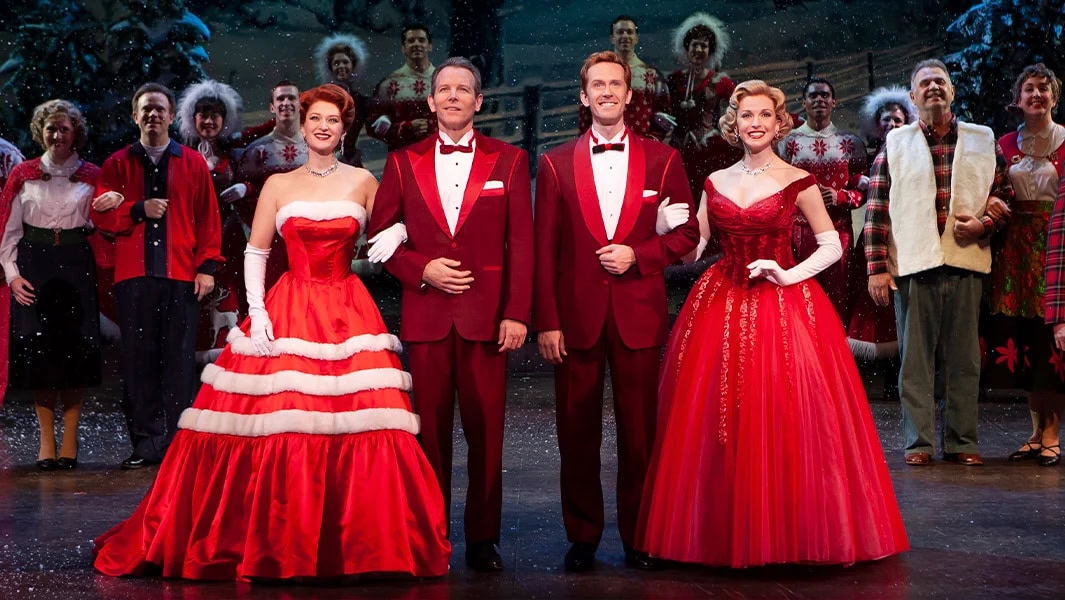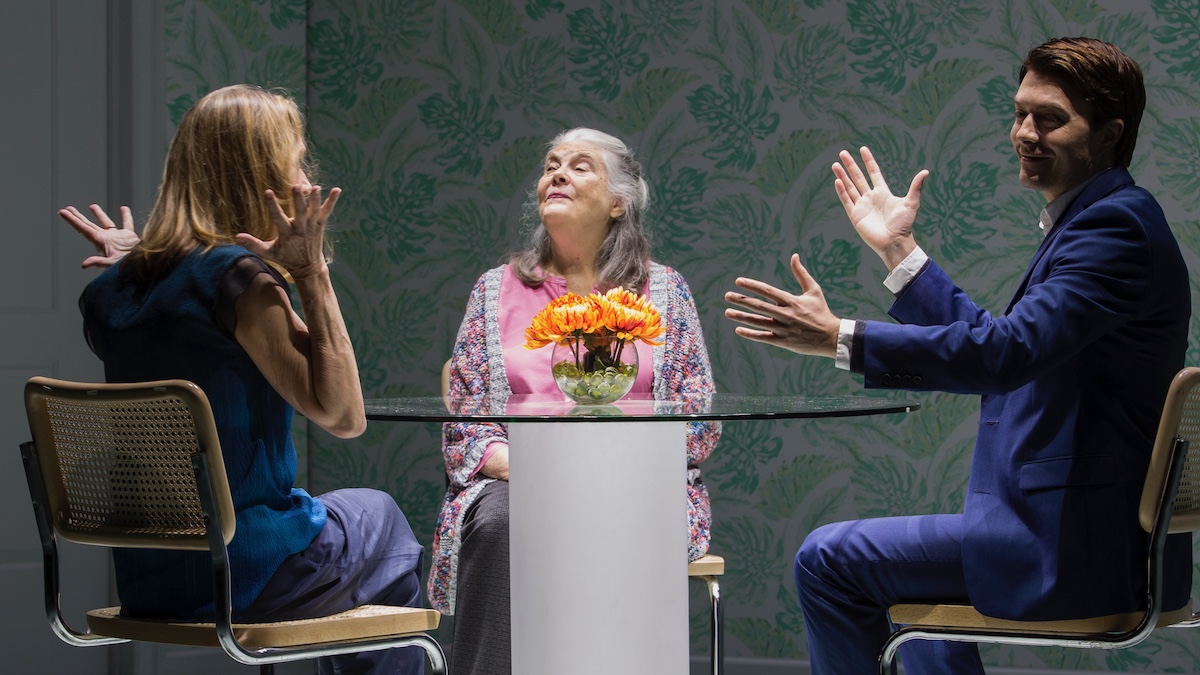
HISTORY
Film
Paramount Pictures released the Technicolor motion picture White Christmas on October 14, 1954. Directed by Michael Curtiz, the film starred Bing Crosby, Danny Kaye, Rosemary Clooney and Vera-Ellen. Irving Berlin first suggested a film based on his hit song in 1948, but it took a few years for the project to reach fruition. The movie was a huge hit: White Christmas earned a whopping $12 million (over $140 million in 2024 dollars), making it the highest-grossing film of 1954 and – at the time – the highest-grossing musical film ever released.
Stage
The stage adaptation of White Christmas opened on Broadway at the Marquis Theatre on November 4, 2008, after several successful engagements throughout the United States. Directed by Walter Bobbie and starring Stephen Bogardus, Jeffry Denman, Kerry O’Malley and Meredith Patterson, the show was an audience favorite; it returned to Broadway the following year, starring James Clow, Tony Yazbeck, Melissa Errico and Mara Davi.
PLOT
Film and Stage
While serving in WWII, army buddies Bob Wallace and Phil Davis develop a song-and-dance act to entertain their fellow servicemen. Ten years later, after achieving success as a professional showbiz duo, they encounter two beautiful singing sisters named Betty and Judy. With romance in mind, the guys follow the gals to their Christmas show at the Columbia Inn in Pine Tree, Vermont. When they arrive, the four performers learn that the floundering lodge is owned and operated by Bob and Phil’s former commanding officer, Major General Waverly. Working together, they vow to rescue the business. Complications inevitably ensue, but in the end, the two couples manage to find love, save the inn, and honor the dignity of their beloved commander.
CHARACTERS
Film and Stage
Bob Wallace – Sensible, ambitious, wholesome and talented, Bob is a classic leading man. A smooth and polished crooner onstage, he loses his composure offstage when he encounters Betty.
Phil Davis – A comic song-and-dance performer, Phil can do it all. With humor and versatility, he brings a goofy spark to their act – and their friendship. In the stage show, Phil is quite the womanizer… that is, until he meets his great love, Judy.
Betty Haynes – A singer of quiet beauty and charm, Betty is a class act. Though somewhat reserved, she’s willing to put her foot down when she means business.
Judy Haynes – A vibrant song-and-dance performer, Judy has more fire and ambition than her sister. Her vivacity and sense of humor make her a perfect match for Phil.
General Henry Waverly – Kindhearted and fair-minded, the General is a respected and beloved leader. In his late 50s or mid 60s, he is a simple, decent man.
Martha Watson (Emma in the film) – A winning, appealing character-comedienne, Martha manages everything at the inn with skill and a bit of sass. In the stage show, Martha is a retired hoofer – a former vaudevillian with plenty of talent left to share.
Susan Waverly – The general’s granddaughter is a composed teen in the film, but a firebrand of a tween in the stage show. Perky and optimistic, she ultimately grows to love show business.
SONGS
Film (Songs in bold do NOT appear in the stage version)
- “White Christmas” – Bob
- “The Old Man” – Bob, Phil & Men
- Medley: “Heat Wave/Let Me Sing and I’m Happy/Blue Skies” – Bob & Phil
- “Sisters” – Betty & Judy
- “The Best Things Happen While You’re Dancing” – Phil & Judy
- “Sisters (Reprise)” – lip synced by Bob and Phil
- “Snow” – Bob, Phil, Betty & Judy
- Medley: “I’d Rather See a Minstrel Show/Mister Bones/Mandy” – Bob, Phil, Betty, Judy & Chorus
- “Count Your Blessings” – Bob & Betty
- “Choreography” – Phil
- “The Best Things Happen While You’re Dancing (Reprise)” – Phil & Chorus
- “Abraham” – Instrumental
- “Love, You Didn’t Do Right by Me” – Betty
- “What Can You Do with a General?” – Bob
- “The Old Man (Reprise)” – Bob & Men
- “Gee, I Wish I Was Back in the Army” – Bob, Phil, Betty & Judy
- “White Christmas (Finale)” – Bob, Phil, Betty, Judy & Chorus
Stage (Songs in bold were ADDED or significantly expanded for the stage version.)
Act I
- Overture – Orchestra
- “Happy Holiday” – Bob, Phil
- “White Christmas (Music Box Version)” – Bob, Phil, Sheldrake, GIs
- “Happy Holiday/Let Yourself Go” – Bob, Phil, Ensemble
- “Love and the Weather” – Bob, Betty
- “Sisters” – Betty, Judy
- “The Best Things Happen While You’re Dancing” – Phil, Judy, Quintet
- “Snow” – Phil, Judy, Mrs. Snoring Man, Snoring Man, Bob, Betty, Passengers
- “What Can You Do With a General?” – Martha, Bob, Phil
- “Let Me Sing and I’m Happy” – Martha
- “Count Your Blessings” – Bob, Betty
- “Blue Skies” – Bob, Ensemble
Act II
- “I Love a Piano” – Phil, Judy, Ensemble
- “Falling Out of Love Can Be Fun” – Martha, Betty, Judy
- “Sisters (Reprise)” – Bob, Phil
- “Love, You Didn’t Do Right by Me/How Deep is the Ocean?” – Betty, Bob
- “The Old Man” – Men
- “Let Me Sing and I’m Happy (Reprise)” – Susan
- “How Deep is the Ocean? (Reprise)” – Betty, Bob
- “Blue Skies Overture/ The Old Man (Reprise)” – Men
- “White Christmas” – Bob, Company
- “I’ve Got My Love to Keep Me Warm” – Company
DETAILS
Film and Stage (Listed chronologically by occurrence in the story)
Opening: In addition to the title song, Bob and Phil sing the Berlin classic “Happy Holiday” to open the stage musical. In the film, Bob is already an established performer, while Phil is a newbie. After Phil saves Bob’s life during an air attack, Bob agrees to collaborate after the war. In the stage show, Bob and Phil perform as equals, and there is no battle action scene.
Ralph Sheldrake: This character, added for the stage version, appears first in the opening sequence as a comic army buddy to Bob and Phil. Later, he becomes a high-powered executive at the Ed Sullivan Show. (In the film, the popular TV show is called the “Ed Harrison” Show.)
“Love and the Weather”: Bob and Betty get this additional “I Want/I Am” song towards the top of the stage show, using the power of music to reveal their outlook on love and life.
The Haynes Sisters’ act: In the film, Betty and Judy sneak out of the theatre after their act, to evade a persistent sheriff sent by their unscrupulous landlord. To buy them some extra time, the guys lip sync their own version of “Sisters.” In the stage musical, the Haynes sisters simply head out to Vermont after their act. (Bob and Phil sing their version of “Sisters” later, as a fun moment during rehearsals at the Columbia Inn.)
“Snow”: In the film, only the four leads sing Berlin’s wintertime classic, but in the stage version, a full chorus joins in.
Martha/Emma: The lovable, tough-as-nails busybody, named “Emma” in the film but “Martha” onstage, manages the Inn and will do anything for the General. In the stage version, Martha’s part is significantly expanded. Turns out, she was once a vaudeville hoofer herself, and she sings a brassy rendition of “Let Me Sing and I’m Happy,” a song that only appears as a snippet during a montage in the film. The stage show also suggests a possible romance between Martha and the General.
“What Can You Do with a General?”: In the film, Bob sings this song on the Ed Harrison show. In the stage musical, it’s a non-diegetic song (that is, not presented as part of a performance within the show) sung by Martha, Bob and Phil.
Susan: In the film, the General’s granddaughter is a demure, older teen with very little dialogue. In the stage show, she’s a spunky 9-year-old with a big belt and some great one-liners.
Show-within-the-show: In the film, the big revue they’re all rehearsing includes a minstrel medley, a wacky comic number called “Choreography,” a high-energy dance to an instrumental version of Berlin’s song “Abraham,” and a quartet version of “Gee, I Wish I Was Back in the Army.” None of these appear in the stage musical. Instead, the revue includes “Blue Skies” as a huge production number featuring Bob, “I Love a Piano” as a high-energy tap showstopper featuring Phil and Judy, and an extended version of the title song, “White Christmas.” Martha also contributes a gutsy, belted rendition of “Let Me Sing and I’m Happy,” which Susan later reprises. (“Let Me Sing…” appears in the film as a tiny snippet in a montage of numbers performed by Bob and Phil.)
Judy and Phil: In the movie, Judy and Phil have virtually no conflict – they immediately team up to connect Bob and Betty, even faking their own engagement to inspire Betty. In the stage show, their romance is a bit rockier; Phil has a reputation as a bit of a ladies’ man, and Judy isn’t sure she can trust him. Of course, in both versions, they wind up happily together.
“Falling Out of Love Can Be Fun”: This jaunty added number gives the three female leads – Betty, Judy and Martha – a chance to bond as they voice their disappointment with the men in their lives.
The big misunderstanding: In the film, Emma listens in on Bob’s phone conversation and mistakenly believes that Bob is trying to profit from the General’s situation by exploiting his story on television. In the stage show, Martha thinks Bob is suing the General to profit from a real estate deal.
“Love, You Didn’t Do Right by Me”: In the film, Rosemary Clooney (along with her backup boys in black) delivers her powerful torch number as Bob silently watches from his table. In the stage version, Bob voices his feelings as well, countering with “How Deep Is the Ocean?”
Bonus number: In the stage show, after the bows, the entire company joins in a rousing rendition of “I’ve Got My Love to Keep Me Warm” to send the audience off with some festive holiday cheer.
For more information about Irving Berlin’s White Christmas and other great musicals by Irving Berlin, visit Concord Theatricals in the US or UK.

Inspired by True Events: A Conversation with Playwright Ryan Spahn

Plays About Technology

